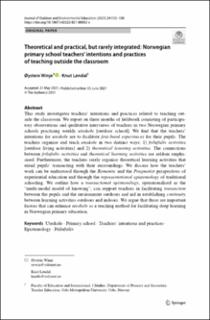Theoretical and practical, but rarely integrated: Norwegian primary school teachers’ intentions and practices of teaching outside the classroom
Peer reviewed, Journal article
Published version
Permanent lenke
https://hdl.handle.net/11250/2981979Utgivelsesdato
2021-06-15Metadata
Vis full innførselSamlinger
Originalversjon
Journal of Outdoor and Environmental Education (JOEE). 2021, 24 (2), 133-150. https://doi.org/10.1007/s42322-021-00082-xSammendrag
This study investigates teachers’ intentions and practices related to teaching outside the classroom. We report on three months of feldwork consisting of participatory observations and qualitative interviews of teachers in two Norwegian primary schools practising weekly uteskole [outdoor school]. We fnd that the teachers’ intentions for uteskole are to facilitate frst-hand experiences for their pupils. The teachers organise and teach uteskole in two distinct ways: 1) friluftsliv activities [outdoor living activities] and 2) theoretical learning activities. The connections between friluftsliv activities and theoretical learning activities are seldom emphasised. Furthermore, the teachers rarely organise theoretical learning activities that entail pupils’ transacting with their surroundings. We discuss how the teachers’ work can be understood through the Romantic and the Pragmatist perspectives of experiential education and through the representational epistemology of traditional schooling. We outline how a transactional epistemology, operationalised as the “multi-modal model of knowing”, can support teachers in facilitating transaction between the pupils and the environment outdoors and aid in establishing continuity between learning activities outdoors and indoors. We argue that these are important factors that can enhance uteskole as a teaching method for facilitating deep learning in Norwegian primary education.

